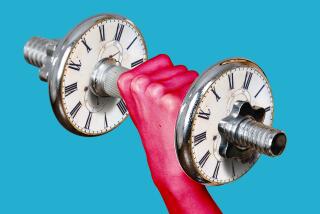The Pounds Can Creep Up During ‘Danger Years’
- Share via
Are there age-related “danger zones” for weight gain during adulthood?
Yes, suggests a new study that tracked 10,000 adults, ages 25-74, for a decade and found weight gain is more likely at certain ages than others.
First, the bad news:
* Major weight gain--defined in this study as 30 pounds--occurred most often in the 25-to- 34-year-old age group.
* But a subset of test subjects, people who began the study at a normal weight and had a major weight gain, were most likely to put on the pounds between the ages of 35 to 44.
* Women were twice as likely as men to have a major weight gain.
David F. Williamson, an epidemiologist at the federal Centers for Disease Control in Atlanta who led the study, believes that so-called “middle-age spread” may begin well before middle age. “Becoming fat and being fat are two different phenomena, although people tend to focus on the aftermath,” he said.
But there’s some good news from the study, published in this month’s Archives of Internal Medicine.
* About 40% of the men and 35% of the women maintained their weight within about 6.5 pounds, Williamson said. Older people didn’t tend to gain weight during the study. Less than 1% of subjects ages 65-74 had major weight gains, although Williamson speculates some were ill or had poor appetites for other reasons.
* Weight gain isn’t inevitable with age, Williamson believes. “Or at least not to the magnitude we’ve seen.” Keeping off excess pounds requires only prudent eating and exercise, Williamson said. He suggests nothing more than 45 minutes of “purposeful” walking every day.
Other weight control experts say the findings in the federal study mirror their own clinical findings about weight gain. “Our clients are primarily females, between 25 and 54,” said Margaret Kohlberg, a spokeswoman for Weight Watchers’ International.
Women sometimes develop weight problems after their first pregnancy, said Annette Natow, a New York dietitian and weight loss expert who wrote “The Fat Attack Plan” (Pocket Books, 1990), a how-to book on trimming fat from the diet. “Men gain weight when they assume full-time work.”
“Men gain weight due to job stress and ‘abuse of lifestyle’ behaviors like drinking and eating rich desserts,” added Dr. David Heber, director of the University Obesity Center at the UCLA School of Medicine. “For women, hormonal changes are a major cause of weight gain.”
POINT COUNTERPOINT The At-Home Pap Test: Is It a Good Option?
Women should undergo a Pap test every one or two years to help detect cervical cancer in its early stages, most doctors agree. But many women don’t.
The developers of an at-home Pap test say their product, not yet approved by the Food and Drug Administration, may make it easier and less embarrassing for women to have the test. To complete the home test, women use a douche-like device to collect vaginal fluid and then mail a sample to a laboratory for analysis.
Bill Truglio, vice president of Medtech Diagnostics, the Bohemia, N.Y., firm developing the MY-PAP, says comparisons of the home test with the traditional Pap test have shown the two methods are almost equally accurate.
But there’s opposition to the home test, with some doctors saying Pap tests are best left in the hands of health-care professionals. Even experienced doctors and lab workers can find Pap tests difficult to perform and interpret, they point out.
Here are two views:
* Dr. J. S. Wilkenfeld, pathologist, Spring Branch Memorial Hospital, Houston; spokesman, College of American Pathologists.
“Only trained health-care professionals should do a Pap smear. It takes a lot of experience (to collect the specimen and to interpet it). To get a good specimen, you must get cells from the cervix, for instance. If an inexperienced person does the Pap, it’s a potluck type of test.
“And the Pap is not the only reason for seeing the doctor. The pelvic examination by the physician, which accompanies the Pap, is part of a valuable, comprehensive exam.”
* Dr. Fred Given, gynecologic oncologist, Norfolk; professor of obstetrics and gynecology, Eastern Virginia Medical School.
“We have compared several hundred office Pap tests with the home Pap test. So far, we have found the home test just about as accurate as the office test.
“The home test is not a substitute for a pelvic examination. But it’s a good screening tool for women who won’t or don’t get an office Pap test. Some women say they’re just too busy to go in for a Pap. This test will also be a godsend in areas where medical care is not easily attainable.”
SHOPTALK Video Rescues Gym Neophytes
Newcomers at a health club can feel as intimidated as a 98-pound weakling on a beach full of bullies. They may feel out of shape, not to mention confused about how to operate weight-training machines.
To the rescue comes Beginner’s Break, a 35-minute video that gives neophytes a head start in the privacy of their own home.
“The tape takes you, beginning to end, through what you will experience in a gym,” said a spokeswoman for Health for Life, the distributor of the $29.95 tape. (Information: (800) 523-9983). “It describes how to use most weight-training machines, for instance, and what muscle groups each machine works,” she said. “It’s not going to take the place of a personal trainer, but it will reduce intimidation for first-time gym-goers.”
“The concept sounds good,” said Mike Trexler, associate director of continuing education for the Institute for Aerobics Research in Dallas. He has two other tips for new fitness buffs:
“Go to a reputable fitness center with trainers certified by the Institute or the American College of Sports Medicine. Ask a trainer to take you through the machines.”






